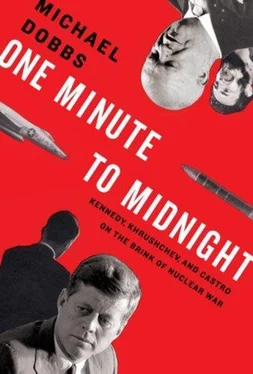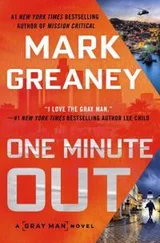10:30 A.M. SATURDAY, OCTOBER 27
Kennedy had guessed right. The Soviet premier had written a second letter, posing a new condition for the withdrawal of his missiles from Cuba. Unlike the earlier message, this one was being broadcast to the world over Radio Moscow.
The mere mention of the Jupiter missiles in Turkey irritated the president. He was angry at Khrushchev for cynically raising the stakes at the very moment when the two superpowers seemed to be groping toward a solution to the crisis. But he was also angry with his aides for failing to prepare the Turks for the possible removal of the Jupiters, and making a shibboleth out of NATO solidarity. And he was angry at himself for having agreed to deploy the already obsolescent weapons in the first place.
Everybody acknowledged that the Jupiters were “a pile of junk,” in McNamara’s phrase. The missiles themselves were squat and fairly short. From Cigli Air Base on Turkey’s western coast, the missiles could land a 1.44-megaton nuclear warhead—one hundred times the power of the Hiroshima bomb—on Moscow in just under seventeen minutes. The problem with the Jupiters was that they were deployed above the ground, on unprotected sites. Before they could be fired, they had to be fueled with liquid oxygen, a procedure that took at least fifteen minutes. Unlike the Soviet missiles in Cuba, they could not easily be moved to new launch positions. This made them easy targets for a preemptive strike, if the Kremlin suspected that the United States was about to go to war.
It had taken four years, and a lot of diplomatic arm-twisting, to find a home for the Jupiters. Since their range was limited to 1,700 miles, there was no point deploying them in the United States. Eisenhower felt in retrospect that “it would have been better to dump them in the ocean instead of trying to dump them on our allies.” Eventually, Turkey and Italy agreed to accept them, and they became fully operational in March 1962.
Unlike the Italians, who only accepted the missiles as a favor to Washington, the Turks regarded the outdated Jupiters as a symbol of national prestige. U.S. Air Force officers retained control over the warheads, but the missiles themselves were transferred to Turkish custody on October 22, the very day that Kennedy went on television to announce the blockade of Cuba. Turkish crews were trained to fire them. The weapon’s gleaming white facade bore a Turkish flag and a not-very-subtle depiction of a mushroom cloud with an arrow through it. Shielded at the base by large metal skirts, the Jupiters resembled giant minarets.
Kennedy was so concerned about the Jupiters that he issued a secret instruction to American officers to destroy or physically disable the missiles rather than risk their use without his authorization. The Jupiters were meant to serve as a nuclear trip wire, linking the security of Turkey and other NATO countries irrevocably to the security of the United States. But Kennedy worried that a Soviet attack on the missiles might trigger nuclear war automatically, without any presidential input. A senior Pentagon official, Paul Nitze, assured him that this was not the case, but he remained skeptical. “I don’t think we should take the Chiefs’ word on that one, Paul,” he had insisted.
The ExComm had considered the possibility of a Turkey-Cuba missile trade almost from the start. Kennedy agreed with McNamara that Khrushchev’s “price” for withdrawing his missiles from Cuba was likely to be the removal of American weaponry from Turkey and Italy. He had even asked Sorensen to draft a letter offering Khrushchev such a deal; but it was never sent. The president did not want to be seen to bargain under duress, and his advisers began raising political objections. The Friday letter from Khrushchev, combined with the unofficial Soviet approach to John Scali, led everybody to hope that a swap would not be necessary.
With his finely tuned political antennae, Kennedy sensed immediately that Khrushchev’s formal offer of a Turkey-Cuba missile trade would be greeted favorably by European public opinion. His advisers believed it would be politically disastrous to abandon the Turks. The president found himself in a minority of one on the ExComm, with only tepid support from Bobby.
“We’re going to be in an insupportable position on this matter if this becomes his proposal,” Kennedy told his aides. “He’s got us in a pretty good spot here. Because most people would regard this as a not unreasonable proposal.”
“But what most people, Mr. President?” Bundy wanted to know.
“I think you’re gonna have it very difficult to explain why we are going to take hostile military action in Cuba, against these sites… when he’s saying, ‘If you get yours out of Turkey, we’ll get ours out of Cuba.’ I think you’ve got a very tough one here.”
“I don’t see why we pick that track, when he’s offered us the other track in the last twenty-four hours.”
Kennedy interrupted his national security adviser impatiently. “Well, he’s now offered us a new one!”
Taylor came to Bundy’s support. “You think the public one is serious when he has a private one?”
“ Yes! We have to assume that this is their new and latest position, and it’s a public one.”
Nitze speculated that Khrushchev might be pursuing two tracks at once: a private track “related solely to Cuba,” and a public track designed to confuse public opinion “and divide us with additional pressures.”
“It’s possible,” JFK conceded.
Bundy was emerging as the spokesman for the hawks. He warned that the U.S. position would “come apart very fast” if “we accept the notion of the trade at this stage.” Talking to the Turks about withdrawing the missiles was tantamount to “trying to sell our allies for our own interests.”
“That would be the view in all of NATO,” Bundy lectured. “Now it’s irrational and it’s crazy, but it’s a terribly powerful fact. ” Besides, “the problem is Cuba. The Turks are not a threat to the peace.”
Kennedy cut the discussion short. Before deciding how to respond to Khrushchev, the White House should issue a statement drawing attention to contradictions in the Soviet position. He was still concerned that “you’re going to find a lot of people who will find this is a rather reasonable position.”
“That’s true,” acknowledged Bundy.
“Let’s not kid ourselves.”
In Moscow, the official government newspaper Izvestia was rolling off the presses. The editors had remade the front page at the last moment to include Khrushchev’s latest message to Kennedy acknowledging the presence of Soviet missiles in Cuba, and offering to withdraw them, if the United States withdrew its missiles from Turkey.
“Keeping the peace is the main goal of the government of the USSR,” the newspaper declared.
Unfortunately for Izvestia ’s credibility, there was nothing to be done about the commentary on page two, which had gone to press many hours in advance. The writer accused the United States of concocting stories about Soviet missile bases in Cuba. He poured scorn on the notion of a Turkey-Cuba missile swap as a cynical public relations initiative by the “Pentagon propaganda machine.”
11:16 A.M. SATURDAY, OCTOBER 27 (10:16 A.M. HAVANA)
The Soviet generals on duty in the underground command post at El Chico had been following the tracking reports on “Target Number 33” with mounting concern. After overflying Camaguey, it had made a 130-degree left turn over Manzanillo on the southeastern coast of Cuba. From there, it had flown along the northern foothills of the Sierra Maestra toward Guantanamo Bay. The island’s highest mountain range had been a refuge for Castro and his barbudos during the war against Batista and still bristled with secret fortifications, artillery positions, and armed camps.
Читать дальше












